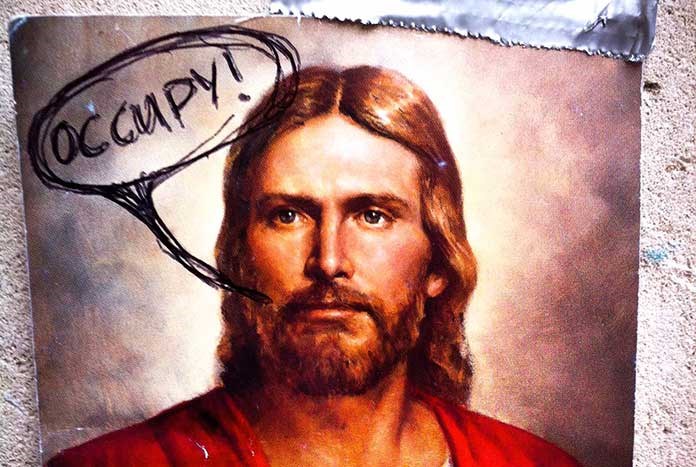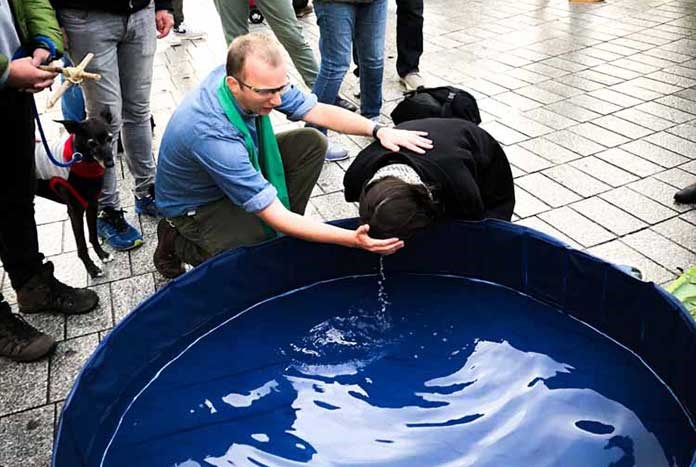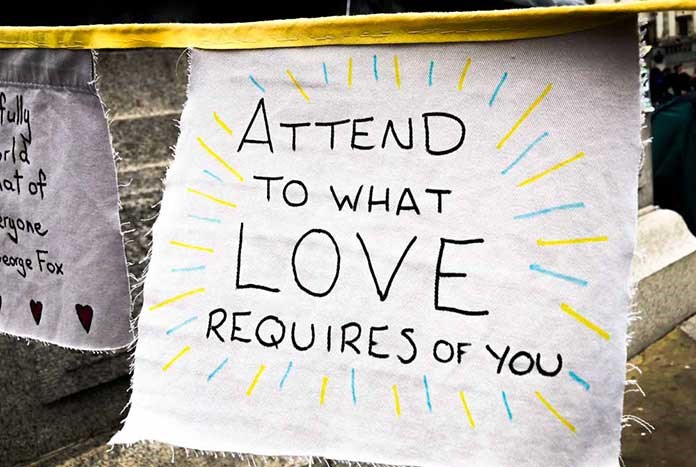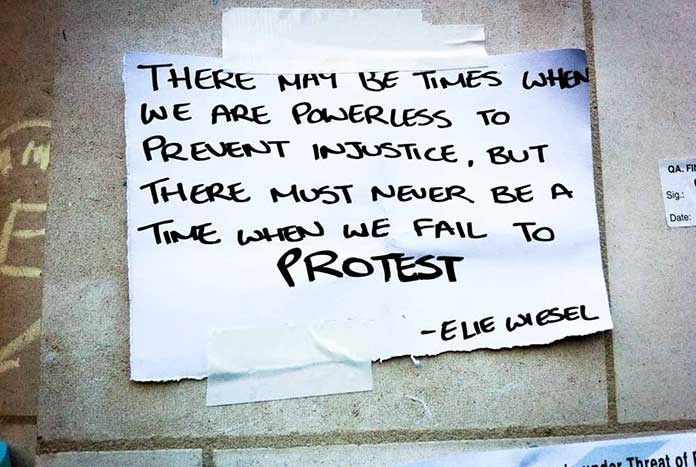Subscribe to ‘Words Of Hope’
Get our emails direct to your Inbox with updates about all our campaigns, trips and events.
For the June edition of Amos’ First Of The Month, guest contributor and former Amos trustee Martin Wroe writes about Occupy, BLM, XR — and wonders if protest makes any difference.

A Canopy of Hope
The roots of our future will bury themselves in the ground and a canopy of hope will reach into the sky. Wangari Maathai
Scene 1
Mayday. A few years back
— — — — — — — —
I’m a writer, looking for a story and I’ve tubed it into central London where people are gathering for an anti-globalisation rally. Mayday usually brings a march in London and I’ve an idea for a story on people who want to change the world.
The escalator up from the underground is empty except for a woman wearing a hijab who for a fleeting second my unexamined and unconscious bias, or my writers imagination, tells me is a threat. (Recent news coverage has featured stories of women forcibly recruited into acts of terror.) Reminding myself of my deeply buried prejudices I reach the street where there is no sign of a march.
After five minutes fruitless walking I find the woman in the hijab walking towards me and ask her if she has seen anybody trying to change the world. She hasn’t but she is also looking for them. She knows the march will arrive at Trafalgar Square eventually because she is one of the speakers. Can she try out her thoughts on me? We head to a coffee shop, shrugging off the fact that the chain is emblematic of the downside of globalisation that she is going to address.
She makes her speech, we stay in touch and a few years later, we are talking about this day and I confess, with embarrassment, my snap judgement of her. She says not to worry. She had also made a snap judgement of me. She thought I was working for MI5, spying on the anti-globalisation protestors.
Scene 2
— — — — — — — —
October 2011 and I’m sitting in a sprawling tented village with Alice from Tunbridge Wells. Alice is sixty-something, a mother, maybe a grandmother, with silver hair and a look of defiance. She is part of the Occupy London protest which is encamped in the grounds of St Paul’s Cathedral.
She remembers being part of student sit-ins in 1968, being inspired by Martin Luther King and the civil rights movement. As we talk she has a memory that goes even further back, all the way back to the earliest followers of Jesus of Nazareth.
“The world I want to see I glimpsed in 1968 and I see it in the Book of Acts in the New Testament.” she says. “What we have here is the same spirit as the first Christians who had everything in common.”
After five minutes fruitless walking I find the woman in the hijab walking towards me and ask her if she has seen anybody trying to change the world. She hasn’t but she is also looking for them.
I take the opportunity to drop in that on the side I am a volunteer priest and I offer one of my secret handshakes. Reassured that I am not an undercover MI5 agent, Alice breaks down and confesses that she is a life-long Methodist, and was late arriving today because she’d been teaching Sunday School that morning.
Beyond not trusting that the ‘system’ worked for most people, Alice did not have an economic or political agenda, only a vision. She was looking back to the earliest days of the Christian Church to remind her of the life of the world to come. Remembering the past to help her remember the future.
Scene 3
Some days in a week in October 2019
— — — — — — — —
Day 1
I am carrying a long cardboard box containing a gazebo. It is not an offensive gazebo but how will the police know this? The lines of their green jackets are all over Lambeth Bridge, now renamed ‘the faith bridge’, one of several bridges ‘taken’ by Extinction Rebellion (XR) demonstrators early this Monday morning.
We sneak our gazebo into the colourful, rowdy melee on the bridge but there’s no chance to put it up as the police are already taking tents, and people, down. The wooden Noah’s Arc someone built has already been removed to the roundabout outside Lambeth Palace. It lies marooned in exhaust fumes.
We hang our prayer flags from lamp posts across the bridge, pausing periodically as groups of police walk by carrying XR protestors who have been hauled from the middle of the bridge. We cheer and applaud as they come through to a holding area where they are read their rights before being carted off.
I take the opportunity to drop in that on the side I am a volunteer priest and I offer one of my secret handshakes. Reassured that I am not an undercover MI5 agent, Alice breaks down and confesses that she is a life-long Methodist, and was late arriving today because she’d been teaching Sunday School that morning.
We take part in the Muslim call to prayer, in Jewish songs and a Buddhist meditation. We are invited to bow down, kneel and touch the ground with our heads, a symbolic connection with the good earth, with the good water running below this bridge. I’m reminded that in church I never get to kiss the earth like this, only on Fridays when I go to prayers with Mohamed at the Mosque.
The Rev Azariah France-Williams, who has a fine voice, leads us in a call and response gospel number. We sing gospel songs and protest songs and prayer songs and eventually — this is when I realise the extent of the emergency — I’m singing 1970’s evangelical choruses. I remind myself to get over myself and anyway people are passing around cake.
There are a lot of people in clerical collars and I notice this may be the first time in my life I have been with a collective noun of clergy and not felt embarrassed. I might even be a little proud. I sit on the ground next to one of these women, who uses a wheelchair, and hold up one side of her banner while she has her sandwiches.
Day 2
An inflatable paddling pool sits on a traffic island off Trafalgar Square, the place to which to which XR protestors, displaced from London’s bridges, have now decamped. A sign next to it from Christian Climate Action, a sister of XR, reads ‘BAPTISMS’. I am planning to stand in solidarity… at a slight distance.
It all seems a bit naff but as usual I’m wrong. I’m drawn in by the fire and brimstone sermon of a man in a Yorkshire accent telling us that baptism is about repentance and now is the time for us to repent from ‘the unholy trinity of unrestrained capitalism, consumerism and individualism’.

On The Streets: A member of the public gets baptised on a traffic island near Trafalgar Square during an XR demonstration in London.
— — — — — — — —
He invites us be baptised in light of the climate catastrophe. Something about the theatre of it — being baptised in a paddling pool on a central London road normally buzzing with traffic — rings true. It seems to be reclaiming another religious rite from the stylised over-elaboration of the ecclesiastically correct.
I stand with a dozen others around the pool and the maverick minister starts baptising us in the name of God and ‘the rebel Jesus’, then inviting us to baptise others. I baptise the man next to me in the name of god, and a few of the ways I understand her. God, or someone that sounds like her, tells me the rebel Jesus is good with this.
Day 3
— — — — — — — —
Outside the National Gallery, looking down over Trafalgar Square, the Bishop of Liverpool reads The Book of Revelation. Possibly, all of it. I drift in and out. Yoda is levitating next to him, along with more clergy in stoles and XR badges, who are not levitating.
In light of eco-catastrophe, John’s Revelation has a new resonance with its surreal apocalypticism, its dream of ‘a new heaven and a new earth’. A woman from XR says that, “In this emergency, rooted in love, we are all we need” and I think that should go in the next edition of the Bible.
Day 6
— — — — — — — —
“Meet by the plane tree at the horse’s head next to Marble Arch.”
We are embarking on a funeral march for planet earth, a procession of love, grief and rage and despite the rain, there are thousands more here than anyone expected. The horse-drawn glass coffin containing the earth has been delayed by the intervention of XR animal rights campaigners but eventually we head off down Oxford Street at funereal pace.

Wise words: A Quaker saying as a banner at a central London demo.
— — — — — — — —
The traffic comes to a halt, people watching through foggy bus windows. We pass the high-end, big name brands that many of us shop in and sheepishly recognise the compromise and contradictions we are part of.
We consider our complicity in the world we have made. We chant “System Change Not Climate Change”. But how can we perform our performative speech without some kind of conversion, like John the Baptist from Yorkshire put it in Trafalgar Square?
Maybe the new translation for the old word ‘repentance’ is ‘system change’. Inside and outside.
Day 7
— — — — — — — —
There is no-one from The Faith Tent in the Faith Tent on Sunday morning but when I pray God says ‘wait’ and so I wait. And then there are two of us. I continue to wait until there are three of us and soon we are the early church.
Alex, a Baptist from Bedford, moved by the police from his campsite in St James Park, says we should have a service. Someone has a bible. Someone has a prayer.
Our text for the day is taken from a banner hung over one side of Trafalgar Square on which John Newton says, “You may choose to look the other way but you can never say again that you did not know.” We talk about the slave ship captain and his slow conversion towards system change.
Someone finds Amazing Grace on their phone and we all start singing. As the rain pours down, I stand at the tent entrance, holding up the canvas roof to stop an ominous bowl of water collapsing in on us. A gust of wind pulls out a pole and I remember that the divine presence is sometimes disguised in poor weather conditions, like heavy winds.
There is no-one from The Faith Tent in the Faith Tent on Sunday morning but when I pray God says ‘wait’ and so I wait. And then there are two of us.
In the storm we hold a silent meditation and someone says that what they have heard in the meditation is the phrase, ‘I have overcome the world’. Someone else says, “When the Bible says ‘the world’ I always think it means ‘the system... this one that’s gone wrong.”
I think of the philosopher Walter Wink, how he understood that what the Bible calls the ‘principalities and powers of this world’ may be the unjust systems, traditions and institutions of this world, the ones that normalise demonic forces from militarism and poverty to white supremacy and eco-calamity.
System change not climate change
System change
— — — — — — — —
It’s complicated when I am in the system and the system is in me. How do you change the system when you are the system?
Very slowly.
One day at a time sweet Jesus, that’s all I’m asking
from you.
I wrote a prayer, ‘Undone’, for a book called ‘Rage and Hope: 75 Prayers For A Better World’ marking the 75th anniversary of Christian Aid. I was thinking about those lines in the prayer book:
We have left undone those things which we ought to have done
And we have done those things which we ought not to have done.
We have done war while marching against it
And turned up the global thermometer while going green.
It has been subtle, under the radar,
Where we shopped or who we banked with,
Investments we never knew about,
Because we never asked.
We have left undone the systems where the power lives.
It wasn’t that we didn’t think about it,
Just that it was complex and the longer
we umm-ed and aaah-ed,
the more we found the systems lived in us,
The devices and desires in our own hearts…
Dr James Dyke at Exeter University writes,
“To understand you are in a prison, you must first be able to see the bars. That this prison was created by humans over many generations doesn’t change the conclusion that we are currently tightly bound up within a system that could, if we do not act, lead to the impoverishment, and even death of billions of people.”
There are moments in history when we are so incensed at the direction of history — elite institutions, global corporations, corrupt politicians — at what they have done and at what they have left undone, that all we can do is take to the streets.
Sometimes even the politically shy and retiring decide their only course of action is holding high a hand-written slogan in the company of fellow discontents. “I am no longer accepting the things I cannot change,” as one banner put it it after the 2017 US Presidential Inauguration. “I am changing the things I cannot accept.”
But does a million people on a march make any difference? Does two million? We cherish stories of unlikely daring, even foolishness, by individuals resisting the presence of a world they do not believe in, people standing firm whatever the odds.
To understand you are in a prison, you must first be able to see the bars.
Dr James Dyke
They may draw a fleeting fame but everyday countless others too are resisting the odds. Dancing to a different drummer, they constitute a quiet, continuous, disruptive resistance. An alternative narrative in history.
History sometimes judges people with this kind of counter-cultural fearlessness as heroes. Religions may call them saints. But while religions often value saintliness over subversion, true goodness may be less about piety and purity and more about a defiance which draws on a mysterious inner strength we may never even know we have.
On December 1st 1955, a bus driver in Montgomery Alabama demanded that Rosa Parks give up her seat for a white man. Something told Rosa Parks she wouldn’t. “When that white driver stepped back toward us, when he waved his hand and ordered us up and out of our seats, I felt a determination cover my body like a quilt on a winter night.”
Although she was arrested, placed in custody and found guilty in court, her resistance sparked the Montgomery Bus Boycott and within a year the US Supreme Court ruled that bus segregation was unconstitutional.
Occasionally the actions of an individual or small group or some wider uprising of people power will drive political change — like the fall of the Berlin Wall, or maybe this year, reforms to policing laws in the US, following the murder of George Floyd. But more often, charge the cynics, mass protest is just virtue-signalling, a way of saying to like-minded people that you’re on their team.

Always protesting: A quote from Romanian-born American writer, professor, political activist, Nobel laureate, and Holocaust survivor, Elie Wiesel.
— — — — — — — —
When exactly did Occupy achieve the reform of capitalism? Or how come so many people seem to be protesting the same things after so many years of protesting those things? Climate change, institutional racism, LGBT+ rights, gender equality, anti-capitalism.
Against the patriarchy, in favour of rainbows, charge the cynics. Against tanks, in favour of flowers. But the patriarchy is resilient. Like racism and homophobia, like hatred of Jews or hatred of Muslims.
“I can’t believe I still have to protest this fucking shit…” as one widely shared placard astutely noted. It was a sentiment borrowed from a young black woman protesting racism in 2014. Half a century after the Civil Rights movement, why was she still having to protest this stuff?
How effective is it when we take to the streets in mass protest? “We may never know what will result of these actions,” said Gandhi, “but if you do nothing there will be no results.”
When that white driver stepped back toward us, when he waved his hand and ordered us up and out of our seats, I felt a determination cover my body like a quilt on a winter night. Civil Rights campaigner Rosa Parks
To view the efficacy of mass protest in short term policy shifts is not the only lens to use. Asked how he wished to be remembered, the neurologist Oliver Sacks said he’d like it to be thought, “that I had listened carefully to what patients and others have told me, that I’ve tried to imagine what it was like for them.” To use a biblical term, he added, he’d like it to be thought that he “bore witness.”
Sacks understood the significance of bearing witness to the lives of others, often those ostracised or ignored. The most powerful uprisings of public disquiet or longing for social change, are not those which are simply about standing up for people but those which are about standing alongside people.
Standing with people when the march is over, people where we live or work. People that powerful forces seem to be standing against.
Elie Wiesel lost his sister and mother in Auschwitz, and his father at Buchenwald. ‘Night’, is his novel about his first night in a camp, “those moments that murdered my God and my soul and turned my dreams to ashes for ever.”
Wiesel spent much of his life with Holocaust survivors and came to see his role as that of ‘a witness’, to guard against history repeating itself: “To listen to a witness is to become a witness and that consoles us.”
In taking action we bear witness not just to the urgent needs of others but to the direction of history itself. We bear witness by telling another kind of story, says the novelist Arundhati Roy, by trying to hear the quiet breathing of another kind of world.
We don’t know what we should pray for wrote the early Christian teacher Paul of Tarsus but “the Spirit itself maketh intercession for us with groanings which cannot be uttered.”
Paul had no idea that these were the groanings of the Civil Rights Movement, of Occupy, of Black Lives Matter and of XR, that these were the groanings and whispers and birth pangs of a new world coming. A world that might arrive after most of us are gone, but at least a world which is born in the seeds that are planted today.
The most powerful uprisings of public disquiet or longing for social change, are not those which are simply about standing up for people but those which are about standing alongside people.
No-one has put it more wisely than the Kenyan activist Wangari Maathai, who began to plant a new world of sustainable livelihoods and sustainable land in leading the Green Belt Movement in her home country. A movement which has now planted hundreds of millions of trees around the world. “The roots of our future,” she said, “Will bury themselves in the ground and a canopy of hope will reach into the sky.”
Who knows what this world will look like, the view outside the system is murky from within. But in his book Post Growth, Tim Jackson, Professor of Sustainable Development at the University of Surrey, makes a poetic pitch, that perhaps the current system is not beyond reforming, that the seeds of renewal may be found in its ruins.
“Money is not always a virtue. Struggle is not the only basis for existence. Competition is not the only response to struggle. Drudgery is not the only reward for labour. Productivity doesn’t exhaust the return to work. Investment is not a meaningless accumulation of financial wealth. Denial is not the only response to our own mortality.”
I sit at the Faith Bridge and wonder at my broken prayers, imagining that this week is one of those places where the future breaks into the present with an invitation to join it. I know that in the halting, confused, sometimes desperate but often faith-filled movements that want to change this world, I see a window into another world. I see the possibility of system change — inside each of us, outside all of us.
Much as I would like to write that story about people who want to change the world, in the end I’d rather be in a movement of people who are themselves becoming that story. I commit to boycotting the world I don’t believe in and embracing the one I do.
I confess to bearing witness while often being an unreliable witness, trying to practice the commonwealth of heaven, while having one foot and several toes in the system that holds it back.
I pray this without words while gazing at the prayer flags hanging all around me. I imagine a canopy of hope above me, reaching into the sky.
Martin Wroe
— — — — — — — —
Martin Wroe is a writer, occasional broadcaster and volunteer vicar in Holloway, north London. Among his spiritual guides in recent times are Meg Wroe, Mavis Staples, the Iona Community, Laura Marling, Arsène Wenger, Neil Astley, Kae Tempest and Michael Kiwanuka.
More First Of The Month
Other editions of our First Of The Month essays are available to read and download from here.
Words of Hope E-news
Sign up to receive our regular ‘Words of Hope’ emails and keep up to date with all the latest Amos news and information, including details of our trips and events, news from our partners around the world, and all of our campaigns.
Online reflection
Join us for ‘Words of Hope’ online every Tuesday at 5pm — simply click here to join us a few minutes beforehand.
Amos Trust
7 Bell Yard, London
WC2A 2JR
UK
Telephone:
+44 (0) 203 725 3493
Email:
[email protected]
Registered Charity No.
1164234

This item has been added to your shopping basket. Please click on the Checkout button below where you can choose your quantity.
Continue shopping Checkout Close